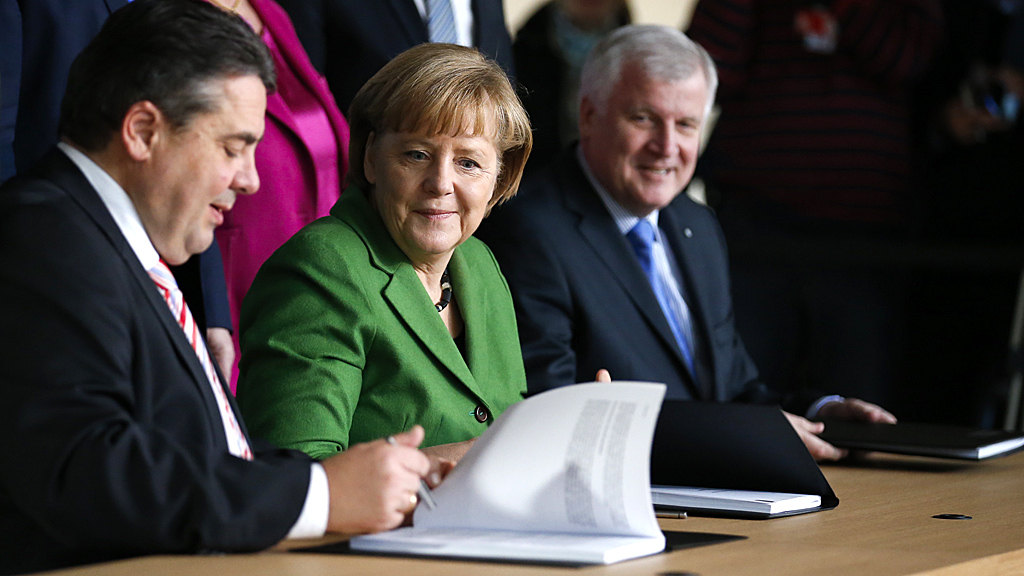Germany’s grand coalition government – the key questions
Chancellor Angela Merkel’s centre-right coalition government has at last struck a “grand coalition” deal with the centre-left Social Democrats. But why the wait and what does it mean for us?

It took two months of negotiations between the out-going coalition government and its new third party, but Germany is now on track to have a new government by Christmas.
How did the lengthly limbo impact the rest of Europe, and what does it mean going forward? Channel 4 News answers the key questions.
Why did it take so long?
Merkel’s Christian Democratic Union (CDU) party and her Bavarian Christian Social Union (CSU) allies were the clear winners in the national elections two months ago.
But Ms Merkel fell short of a parliamentary majority, forcing her into talks with her party’s arch-rivals, the Social Democrats (SPD).
During her first term as Chancellor from 2005-2009, she ruled over an awkward coalition with the SPD.
Four years on, it has taken two months to negotiate the list of unresolved issues and agree to a 185-page policy document.
The agreement will not be final until it is approved over the coming weeks by a postal ballot of the 474,000 card-carrying SPD members, many of them sceptical about partnering with Merkel again.
What impact has the delay had?
The delay was not particularly surprising, Dr Patricia Hogwood, from the University of Westminster’s European politics department told Channel 4 News.
“It could have taken far longer,” Dr Hogwood said. “It was really the only viable option. But the SPD knew they had leverage – so they held out for one thing.”
That one thing was a key policy issue for the SPD – Germany’s first national minimum wage.
Merkel had to agree to SPD demands for a minimum wage of 8.50 euros per hour, which some economists have warned could push up unemployment, particularly in eastern Germany.
In order to prevent that, the wage will be phased in over a period of years until 2017, when the wage formally kicks in nationwide.
This was a “big concession” for Merkel, said Dr Hogwood, and a difficult decision for the right wing.
Otherwise, the delay hasn’t impacted domestic politics a great deal, said Raoul Ruparel, head of economic research at the think tank Open Europe.
“Day to day, the government continued”, he said, with Merkel retaining “caretaker” control.
But across Europe, the grand coalition will come as relief, he said, with Europe now able to get “back to business”.
How did it affect Europe?
In September the Italian magazine l’Espresso published a cartoon depicting a father and son: “Papa,” says the son, “I have to go to the toilet.”
“Hush,” answers the father. “Hold it until after the German elections.”
On economic matters, Mr Ruparel said the rest of Europe “underestimated how large the impact would be”.
The delay on the “banking union” was the big one, Mr Ruparel added. An ambitious project designed to prevent a recurrence of the euro zone’s crippling debt crisis, the union is supposed to be in place by the end of the year.
According to the English-language German website The Local, finance minister Wolfgang Schäuble found himself “more or less powerless” at a recent meeting of EU finance ministers. There he was in Brussels to discuss the banking union – without a mandate to agree a common plan.
With Christmas on the horizon and European elections in May, Europe is now left with a “tight timeline” to get an agreement in place, Mr Ruparel said.
What now for Europe, and beyond?
With the centre-left SPD party now on board, there could be a few bumps on the horizon, Dr Hogwood warns.
“The SPD would rather let Merkel stew with the euro zone crisis while they pursue other, more popular policies,” she said.
For example, Dr Hogwood said, the party is keen to implement a framework for regulating the financial industry which irons out tax havens.
“This could see them at loggerheads with the UK,” she warned. “It won’t be popular with the City of London.”
As for the euro zone, German’s new government will look to formalise a “cash for reform” policy, Mr Ruparel said.
“Reform contracts” could become the next big thing, he said, as Germany looks for more oversight and more control over euro zone countries in return for any more cash.
Though Germany’s foreign policy is largely limited to economic matters, it’s worth watching who is appointed as foreign minister, said Dr Hogwood.
It is telling that neither party had a chapter on foreign policy in their manifesto – as post-war tradition dictates, Germany’s relationship with the rest of the world runs through Europe, and particularly through France.
But Merkel has “almost inperceptively moved away” from the German-Franco position, said Dr Hogwood, towards building relationships with the eastern countries of Poland, Russia and so on.
Though Germany is moving “very, very slowly” on foreign policy matters outside Europe, she said US President Barack Obama has pushed it to become more geo-strategic.
Meanwhile Merkel herself has hinted at supporting the US over Syria, but during its campaign the SPD struck an anti-US chord.
There is talk of Frank-Walter Steinmeier of the SPD returning as foreign minister after holding the post in the last “grand coalition” government.
Which party the future foreign minister belongs to could then indicate how isolated Germany will be on the world stage in the future.
-
Latest news
-
Laughing Boy: New play tells the tragic tale of Connor Sparrowhawk5m

-
Sewage warning system allows some of worst test results to be left off rating system, analysis shows3m

-
Post Office inquiry: Former CEO didn’t like word “bugs” to refer to faulty IT system4m

-
Israeli soldier speaks out on war in Gaza12m

-
PM’s defence spending boost should be ‘celebrated’, says former Armed Forces Minister4m

-




